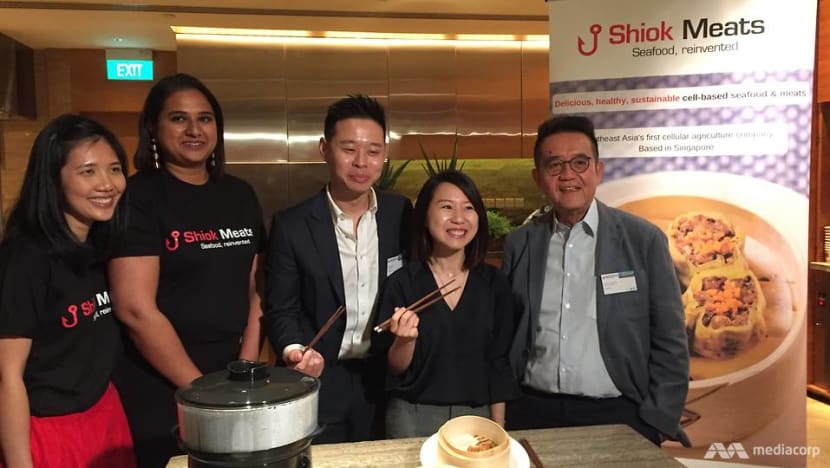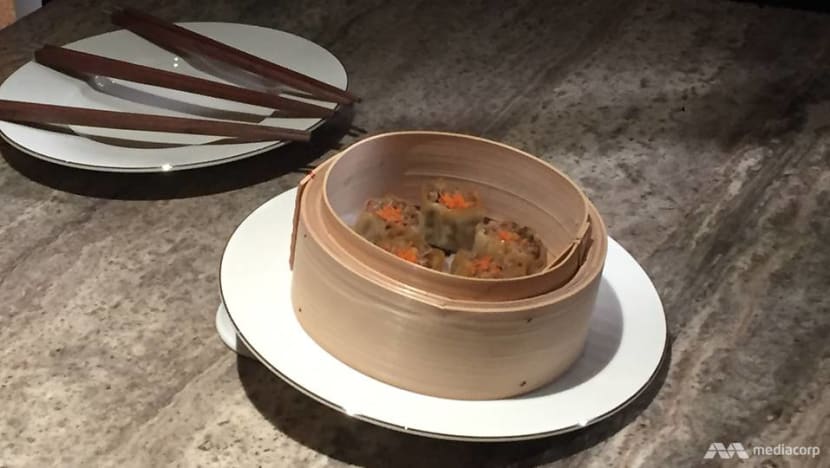Siew mai goes high tech: Singapore's first cell-based shrimp dumplings launched
The first meat to be grown from stem cells in Singapore was unveiled at the second Disruption in Food and Sustainability Summit on Friday (Mar 29).

Co-founders of Shiok Meats Dr Ka Yi Ling and Dr Sandhya Sriram, Director of Innovate 360 John Cheng, APAC Managing Director of Good Food Institute Elaine Siu and CEO of Monde Nissin Henry Soesanto at Shiok Meats's launch of the Shiok Shrimp Dumpling on Friday (Mar 29). (Photo: Cindy Co)
SINGAPORE: Singapore's first cell-based meat venture Shiok Meats lifted the lid on its lab-grown shrimp dumplings at the Disruption in Food and Sustainability Summit (DFSS) on Friday (Mar 29).
There were just eight dumplings showcased at the summit, but the high-tech dim sum took months and S$5,000 to cook up.
Only three people at the unveiling got a taste - all three are advisors of Shiok Meats, a food tech start-up that focuses on growing seafood from stem cells. The Shiok Shrimp Dumpling is their first product.
“It tastes like siew mai!” said Good Food Institute APAC managing director Elaine Siu.

Another advisor, CEO of Monde Nissin Henry Soesanto said the dumplings were "very promising".
All this reporter got was a whiff as Shiok Meats CTO Ling Ka Yi took the dumplings out of a steamer. Yes, they did smell like shrimp.
"The three advisors who tasted it, they definitely said that it tasted like shrimp. So we’re very happy," said Shiok Meats CEO Sandhya Sriram.
Founded in August last year, Singapore-based Shiok Meats is the first cell-based meat company in Southeast Asia. It is the brainchild of two stem cell biologists: Dr Sriram, 33 and Dr Ling, 31.

While cell-based meat companies are not new, with Memphis Meats operating since 2015, most are based in the United States.
Rather than focusing on beef, chicken and pork, Shiok Meats wants to create shrimp, crab and lobster meat for the Asian market.
“(In Asia), we eat a lot of seafood, and not many companies were doing seafood,” she said. “And (personally), Ka Yi and I were very fascinated about saving the ocean as individuals.”
As one of the first companies growing shrimp meat, Shiok Meats had to do everything from scratch.
“There is no academic research out there so even figuring out which part of the animal is a good source for stem cells (was difficult)," she said.
And buying shrimp became a problem, as the company had to find shrimp farms that did not use antibiotics or hormones.
“Currently the way shrimps are being grown in farms, they are being grown in dirty water and being injected with antibiotics and hormones to keep them clean and make them bigger. We had to find very specific shrimp farms for clean shrimp to source our stem cells,” said Dr Sriram.
Cell-based meats have fewer toxins and are less taxing on the earth’s resources, according to Dr Sriram.
“The vision of the company is to completely replace farmed shrimp and wild-caught shrimp. (We want to have) Shiok Shrimp in supermarkets, hawker centres, restaurants, everything,” she said.
For the year ahead, they plan to lower the cost of production by 100 times.
Stem cells have to be placed in a nutrient mix for the cells to grow into meat, but this solution is now too costly for mass production.
This is why creating eight dumplings cost the company about S$5,000.
“If we can hit that magic potion, the price (of the eight dumplings) will come from S$5,000 to S$50,” she said.
She estimates that it would take them at least five years to reach the mass market, but Shiok Meats is in talks with three premium restaurants to use their shrimp by the end of next year.
Many investors have already expressed their interest in Shiok Meats, although most of them are based outside Asia.
“We raised a little more than half a million in two and a half months of starting the company, (but) most of it was money from the US," said Dr Sriram.
FRANKEN MEAT?
Lab-grown meat has had a rocky start with consumers in other countries, with some media outlets labelling it "Franken meat".
Will food-obsessed Singaporeans accept it?
Assistant Professor Charlene Chen of the Division of Marketing and International Business at NTU’s Nanyang Business School, believes that there is a future for cell-based meat in Singapore.
“Consumers often buy products to express their values and identities, and buying cell-based meat is a way to express one’s concern for animal welfare (and) the environment in general,” she said.
Assistant Professor Leonard Lee, of the Department of Marketing at NUS Business School was less enthusiastic.
“Singaporeans may be receptive toward such products that potentially serve broader societal needs,” he said, “(but) consumers in Singapore may also be more risk-averse particularly when it pertains to their health and safety.”
Dr Sriram believes that the mixed reception towards cell-based meat stems from a generational divide, citing surveys that she has done with more than 700 members of the public.
“The Millennial generation are the ones who are more open and receptive because they truly care about the environment and sustainability, and they’re willing to try newer things,” she said. “I think that it’s the older generation that might find it hard to accept.”
Members of the public that CNA spoke to were generally open to trying cell-based meat.
National University of Singapore student, 24-year-old Cheong Yinn Shan said: "I would definitely be keen to try this. The meat industry contributes a lot of greenhouse gases and has a high water footprint, so I will support any innovations to reduce our society’s reliance on factory-farmed meat.”
Ms Jelena Lim, a 23-year-old Lee Kuan Yew School of Public Policy student, expressed reservations.
“I would eat it because I’m curious, but the price has to be comparable to traditional meat, it has to taste good, and there are no ethical dilemmas from using stem cells,” she said.
Retiree Robert Tan, 60, had similar doubts.
“The (long-term effects of cell-based meat) may never be known in our generation, as it may be 50 years down the road. My take is that if FDA (US Food and Drug Administration) and medical authorities say that it is okay, we just follow,” he said.












